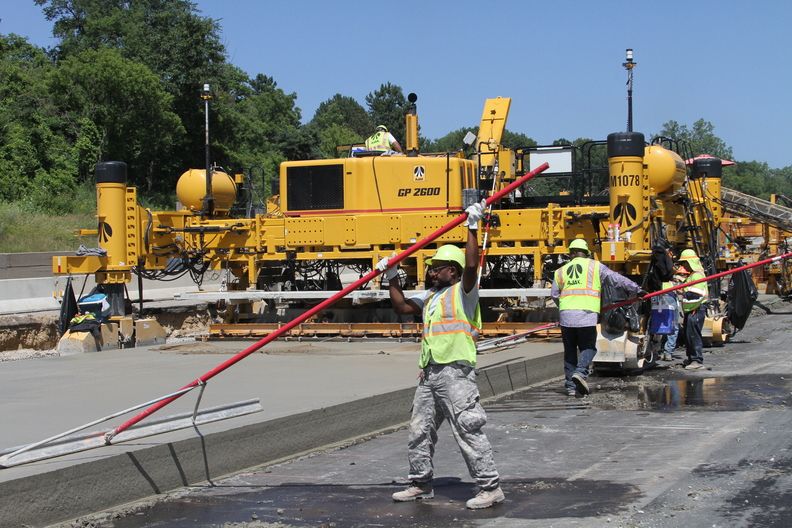The bipartisan $1 trillion infrastructure spending bill pending in Congress is being billed by the White House and proponents as a $7.25 billion shot in the arm for Michigan’s crumbling roads and highways.
It’s actually a $340 million annual shot in the arm for federally funded roadways in the Great Lakes State, according to an analysis of the bill from the Michigan Department of Transportation.
The $7.25 billion the U.S. Senate appropriated for Michigan’s highways in the bill is spread over five years and — here’s the big hidden caveat — it includes the $5.56 billion Michigan already gets from Washington for roads. In actuality, it’s just $1.7 billion in new money for Michigan roads over the next five years — and there’s no guarantee after 2026 the state will continue to receive that much federal funding for highways in future outlays.
“The guys in Washington make it sound like there’s some new nirvana,” said Jamie Jacobs, owner and CEO of Ajax Paving Industries Inc., one of Michigan’s largest road construction companies. “They’re just kind of doing smoke and mirrors as far as I’m concerned.”
Behind the smoke is a road network that Michigan can no longer afford to maintain based on current tax revenues from state and federal sources — namely vehicle registration fees and per-gallon taxes on gasoline and diesel fuel.
The $340 million in new annual federal aid is roughly one-sixth of the minimum $1.9 billion more Michigan needs to be investing annually to get the majority of state trunkline roads in good condition by 2031.
That nearly $2 billion-a-year underfunding figure is nothing new. Former Gov. Rick Snyder’s 21st Century Infrastructure Commission said as much in 2016. But since then, the commission’s report has been paved over with a thick layer of dust on the desks of Michigan legislators.
There’s general agreement among road construction professionals and most political leaders that Democratic Gov. Gretchen Whitmer’s $3.5 billion bonding program to finance highway reconstruction projects is slowing the overall decline of Michigan’s pavement.
“The governor said this is a stopgap,” MDOT Director Paul Ajegba said. “Bonding is not a funding mechanism, it’s just a financing tool to get us to a place where we can all agree, ‘OK, we’ve got a problem, let’s solve it.’ ”
And while it may check off a box on Whitmer’s re-election talking points with voters next year that she did something to fix the damn roads while the Republican-controlled Legislature sat on its hands, it hasn’t fixed even half of the damndest bad roads in Michigan.
New money from the federal infrastructure bill is only dedicated to 88,000 lane miles of “federal aid” roads, typically highways and heavily trafficked boulevards. About 42 percent of those roads were rated in poor condition in 2020 and 36 percent in fair condition, while just 22 percent passed as being in good condition, according to the Michigan Transportation Asset Management Council’s annual report on pavement conditions.
In other words, heading into this current orange-barrel season, four of every five miles of freeway and trunkline road with an I, U.S. or M name were in poor or deteriorating condition.
Even with an influx of new state funding from a modest $600 million fuel and vehicle registration tax increase in 2017 and $600 million from existing state tax revenue, the percentage of state roads in poor condition still increased between 2015 and last year — from 40 percent to 42 percent. Transportation planners say that’s a result of a decade of disinvestment as more and more roads fell into the fair condition category.
And it stands to reason that continued disinvestment in maintenance results in fair roads turning into poor roads. But anyone who lives in an aging suburb of metro Detroit knows it’s the local streets that feed traffic to arterial roads like Telegraph Road in Wayne County and Metro Parkway in Macomb County that are badly in need of repair.
Fifty percent of local roads are rated in poor condition, while 32 percent are rated in fair condition. Just 18 percent of the 165,000 lane miles of local roads were rated in good condition in 2020, according to the Michigan Transportation Asset Management Council.
At present, the Michigan Legislature has no solution for these roads other than status quo funding or letting counties and cities figure it out on their own within the restraints of property taxes as the only permitted revenue source.
MDOT Director Paul Ajegba said he would welcome the additional $340 million in annual federal road funding if the trillion-dollar infrastructure bill passes.
But he too cautions that it’s not a panacea.
“I don’t want (lawmakers) to think this is the end all, be all solution that’s going to solve all of our problems,” Ajegba said.
Transportation planners worry that when the state’s $3.5 billion in bond proceeds and the new federal funds run out by 2026, the road construction industry as a whole will ramp down operations like it did after the 2009 federal stimulus funding expired following the Great Recession.
That means less investment in heavy equipment and skilled operators, which companies like Troy-based Ajax Paving have been making in recent years, Jacob said.
“It’s fits and starts,” said Jacob, who currently has a workforce of 500 employees at Ajax. “Our roads don’t know about fits and starts — and they need to be constantly maintained.”
That’s why this infrastructure bill up for debate in the U.S. House has some folks in the infrastructure business a bit unnerved. They’ve seen this movie before.
“I don’t want the Legislature and others to think all of a sudden that the federal government has come in and saved the day and we can take our foot off the pedal,” Jacob said.
This story appeared in Crain’s Detroit Business. For more, click here.

